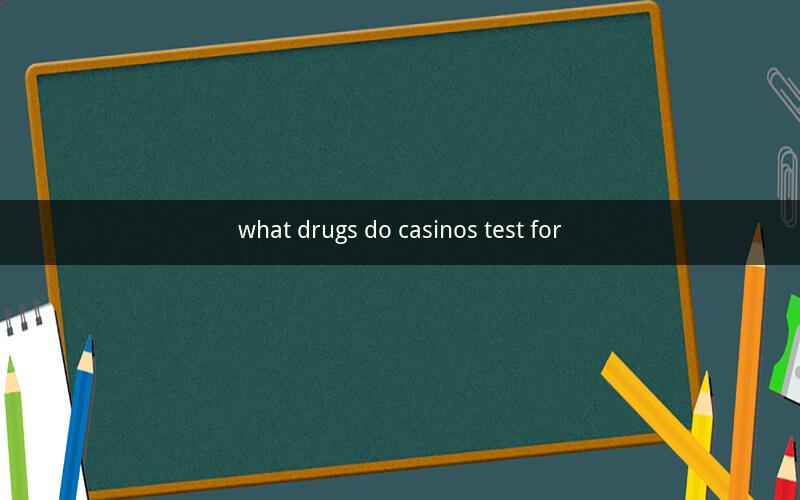
Contents
1. Introduction to Casino Drug Testing
2. The Importance of Drug Testing in Casinos
3. Commonly Tested Drugs
4. Methods of Drug Testing
5. Legal Implications of Drug Testing
6. Challenges and Concerns
7. Conclusion
1. Introduction to Casino Drug Testing
Casino environments are known for their high-stress, high-reward atmosphere. Given the nature of these establishments, it's not surprising that they implement strict policies to ensure the safety and integrity of their operations. One such policy is the mandatory drug testing of employees. This article delves into the various drugs that casinos test for, the methods employed, and the implications of these tests.
2. The Importance of Drug Testing in Casinos
The primary reason for drug testing in casinos is to maintain a safe and secure work environment. Drug abuse can lead to decreased productivity, increased risk of accidents, and a decline in the overall quality of service. By conducting regular drug tests, casinos aim to identify and address substance abuse issues among their employees, thereby protecting both the employees and the patrons.
3. Commonly Tested Drugs
Casinos typically test for a range of drugs, including but not limited to:
- Stimulants: Amphetamines, cocaine, methamphetamine
- Depressants: Barbiturates, benzodiazepines, alcohol
- Opioids: Heroin, morphine, oxycodone
- Hallucinogens: LSD, PCP, mushrooms
- Inhalants: Solvents, aerosols, nitrous oxide
4. Methods of Drug Testing
Drug testing in casinos can be conducted using various methods, including:
- Urinalysis: The most common method, where a urine sample is analyzed for the presence of drugs.
- Blood Testing: Provides a more accurate and detailed analysis of drug use, but is less commonly used due to its invasiveness and higher cost.
- Saliva Testing: Offers a quick and non-invasive alternative to urine testing, though it may have limitations in detecting certain drugs.
5. Legal Implications of Drug Testing
The legal implications of drug testing in casinos are multifaceted. Employers must adhere to federal and state laws regarding privacy, consent, and notification. Additionally, the Americans with Disabilities Act (ADA) requires that employers consider drug abuse as a disability and provide reasonable accommodations for employees who are in treatment for substance abuse.
6. Challenges and Concerns
Despite the benefits of drug testing, there are several challenges and concerns associated with it:
- Privacy: Employees may feel their privacy is being violated.
- Cost: Drug testing can be expensive, particularly if conducted on a regular basis.
- False Positives: False positive results can lead to incorrect conclusions about an employee's drug use.
- Legal Actions: Employees may file lawsuits against casinos if they believe their rights have been violated.
7. Conclusion
Drug testing in casinos is an essential component of maintaining a safe and productive work environment. While it comes with its challenges and concerns, the benefits of identifying and addressing substance abuse issues among employees far outweigh the drawbacks. As long as casinos adhere to legal and ethical standards, drug testing can be an effective tool in promoting a healthy and drug-free workplace.
10 Questions and Answers
1. Q: What is the most common drug tested in casinos?
A: Urinalysis is the most common method of drug testing, and stimulants like amphetamines and cocaine are often the primary focus.
2. Q: Can drug testing be conducted without the employee's consent?
A: Generally, no. Employers must obtain the employee's consent or have a valid reason for conducting a drug test without it, such as a reasonable suspicion of drug use.
3. Q: How long do drugs stay in a person's system?
A: The duration of drug detection varies depending on the drug and the individual. For example, cocaine can be detected in urine for up to three days, while amphetamines can be detected for up to a week.
4. Q: Can an employee be fired for a positive drug test?
A: Yes, an employee can be terminated for a positive drug test, but the employer must follow proper procedures and consider any mitigating factors.
5. Q: Are drug tests always accurate?
A: No, drug tests can produce false positives or false negatives. It's important for employers to interpret test results with caution and consider all relevant factors.
6. Q: What are the legal requirements for drug testing in casinos?
A: Employers must comply with federal and state laws, including the ADA, which requires reasonable accommodations for employees in treatment for substance abuse.
7. Q: Can an employee be tested for drugs after a workplace accident?
A: Yes, employers can conduct drug tests after a workplace accident, especially if there is reasonable suspicion that drug use contributed to the incident.
8. Q: Are there any legal protections for employees who are in treatment for substance abuse?
A: Yes, the ADA provides legal protections for employees who are in treatment for substance abuse, requiring employers to consider these employees as disabled.
9. Q: Can an employee be tested for alcohol use?
A: Yes, alcohol use can be tested through urine, saliva, or breath alcohol tests. However, employers must follow the same legal requirements for drug testing when conducting alcohol tests.
10. Q: What should an employee do if they test positive for drugs?
A: The employee should follow their employer's procedures, which may include an opportunity to explain the positive test result and seek help for substance abuse issues.